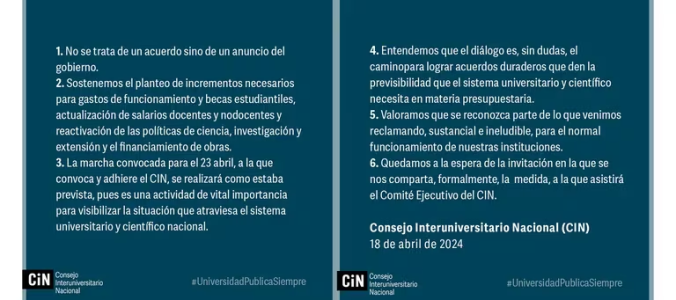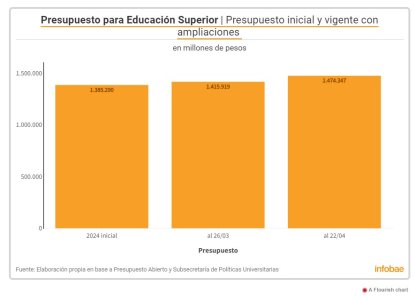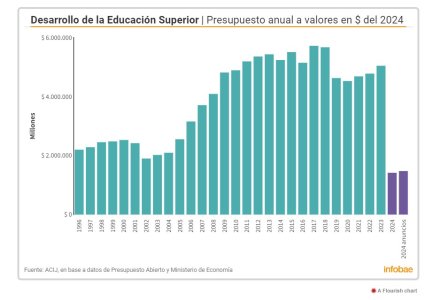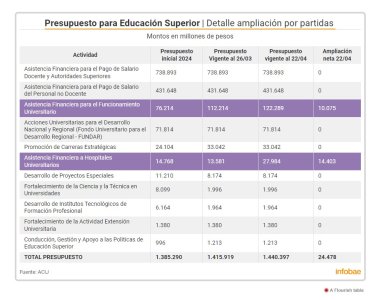All the Answers
Well-known member
Funds for universities: despite the increase in operating expenses specified yesterday, the total budget is 71% lower than in 2023 - Infobae

Source:

Fondos para universidades: pese al aumento para gastos de funcionamiento concretado ayer, el presupuesto total es un 71% inferior al de 2023
Con el último incremento para ese rubro otorgado por el Ministerio de Capital Humano, el presupuesto vigente total pasó a ser de $1.440.397 millones, apenas un 4,1% más que el de 2023, pero queda muy por debajo si se considera la expectativa de inflación para 2024
April 23, 2024
With the last increase for that item granted by the Ministry of Human Capital, the total current budget became $1,440,397 million, just 4.1% more than that of 2023, but it is far below if the expectation is considered. inflation for 2024
By Mariel Fitz Patrick and Sandra Crucianelli

Medical personnel and students protest in front of the Hospital de Clínicas, which depends on the UBA, against the budget freeze (AP Photo/Víctor R. Caivano)
On the edge of this afternoon's massive march whose slogan is " In defense of the Argentine public university ," the Ministry of Human Capital announced last night in a statement that they transferred just over $24,000 million to the 65 public universities for operating expenses. . This item, under the name of Financial Assistance for University Operations , represents only 7.9% of the total budget . From the Undersecretary of University Policies last night they confirmed that they deposited "100% of the operating expenses of the National Universities, with a 70% increase in operating expenses for a total of $10,075 million."
The portfolio in charge of Sandra Pettovello - on which the Ministry of Education depends - thus specified an announcement that she had made last Thursday. However, until yesterday, it had not been reflected in the coffers of the national universities. The transfer of funds sought to counteract the claim of the National Interuniversity Council (CIN) about the definancing of the public higher education system. The body that brings together national universities, that same day, had considered in another statement that this announced increase was insufficient.

CIN statement dated April 18 in response to the latest increase announced by the Government
Likewise, from Capital Humano they reported that “all the specific expenses were allocated for the health function of the Universities of Buenos Aires, Córdoba, Cuyo and La Rioja, in addition to the special and extra reinforcement for the Hospital de Clínicas, which involves almost $14,000 millions of pesos".
The Financial Assistance program for University Hospitals represents just 1% of the total allocated to the Development of Higher Education , the main item that explains more than 90% of the total spending in the budget. The remaining percentage is made up of the PROGRESAR Scholarship program, the University Infrastructure program, and the University Evaluation and Accreditation program (CONEAU), which aims to evaluate university institutions and accreditation of undergraduate and postgraduate courses.

* The amount of $1,474,347 million includes items from Progresar Scholarships, University Infrastructure, and University Evaluation and Accreditation (CONEAU)
According to the initial budget, the 65 national universities and their health institutions had $1,385,290 million (1.3 trillion) allocated for this year, the same amount as in 2023, despite inflation. On March 26 there was a budget increase of $30,629 million, just 2.21%. With yesterday's increase of 70% but only for operating expenses, the current budget rose to $1,440,397 million (1.4 trillion), that is, just 4.1% more .
According to the analysis carried out by the Civil Association for Equality and Justice (ACIJ) , considering the inflation expectation for 2024, this latest expansion implies that the budget assigned to the Higher Education Development Program is equivalent to 71% less than in 2023 . The ACIJ calculation arises from considering an inflation projected by the REM for 2024 of 189%, using an average interannual inflation, which gives an index of 265%.

Yesterday's official announcement
Last night, the Ministry in charge of Pettovello also distributed forms detailing the transfers to each educational institution and university hospitals. This last item included “a special and extraordinary reinforcement for the Hospital de Clínicas and other university hospitals of the UBA, which implies a disbursement of $11,812 million.”With this increase, the Government assured that it “guarantees the absolute continuity of classes” and the second semester, “which is not an impediment to the government's intention to audit and supervise spending.” In fact, he titled the statement “Public education is a right. Auditing is an obligation . ” He also announced that the “current 70% will be added to the other 70% already agreed upon with the CIN authorities, which will be canceled in due course, in the next installment approximately in a month.”
The announcement of the disbursement took place while a press conference called by the CIN was taking place, with representatives of the organizations that will join the march this afternoon, “to make visible a dramatic situation” in their institutions, as they warned. “ They have said that there was an agreement, it is not true . If there had been an agreement, teachers and non-teachers would not be losing against inflation and the principals would not have a 300% increase in expenses, which is not a real increase, but rather an adjustment. Hopefully, because we are looking for it, we are promoting it, we want to go to dialogue, we understand that there are ways, that it is possible, but if the government dedicates all its time to fighting us, it dedicates it to dialogue, we would already have an agreement," questioned the rector of the University of Buenos Aires (UBA), Ricardo Gelpi .
The origin of the crisis
The university financing crisis had as its starting point the decision of the Executive to extend the 2023 Budget for this year, without considering last year's inflation of 211% and the 51.6% accumulated in the first quarter of the year.If it is taken into account that the budget in 2023 was $1,385,290 million (1.3 trillion), and the current one in force for the entire year is $1,440,397 million (1.4 trillion), the interannual drop in budget execution university was 32.6% , according to the calculation made by ACIJ. “This figure is even more pronounced than the average execution of national public spending, which decreased by 30%,” said Alejandro Gaggero , coordinator of the ACIJ Fiscal Justice program to Infobae .
“Much of this drop in year-on-year execution is explained by the fact that 80% of the university budget goes to salaries , which were well below inflation,” added this sociologist. To calculate this budget reduction, ACIJ took the interannual variation month by month, from March 2023 and without considering the estimate for March to March 2024, which showed an effective 287%.
In effect, 52.2% of the total university budget goes to the payment of salaries of university professors and 30.5% of non-teachers. However, the allocations for this item were not increased so far this year, so the items remain the same as in December 2023. This implies that the universities will not have funds to assume the joint payments.
“ Without a budget expansion, university funding would register its lowest level since 1996 , the first year on record, taking all budgets at values in 2024 pesos,” Gaggero warned.
Analysis of the programs
When highlighting the activities included in the item Development of Higher Education that depends on the Ministry of Education - today under the orbit of the Ministry of Human Capital -, the one that had the largest cut between the initial budget for this year and the current one was that intended for the Strengthening of Science and Technology in Universities . It went from $8,099 million to $1,996 million this year, $6,102 million less in net values, a decrease of 75%. As of April 17, 19% have been executed.
Next in percentage of cut in this year's budget, between the initial forecast at the beginning of the year and the current budget, is the Development of Technological Institutes for Vocational Training . At the beginning of 2024, it had a budget of $6,164 million and it remained at $1,964 million, 68% less, with a net loss of $4,200 million. This program had zero budget execution as of April 17.
Another of the items cut was that allocated to the Development of Special Projects , which had $11,210 million and was reduced to $8,174 million, that is, a reduction of $3,036 million, a decrease of 27%. Only 1% was executed.
The fourth item that had a reduction in the current funds last March is Financial Assistance to University Hospitals , which is the item, however, that presents the highest execution: 119%. It had a current budget that replicated that of 2023 of $14,768 million; Then it was cut by 8% to $13,581 million ($1,187 million less), but $16,160 million have already been executed due to the budgetary reinforcement granted by the national Executive in response to the claim of a virtual paralysis of hospitals such as Clínicas, the Ángel Oncology Institute Roffo or the Dentistry Hospital, which serve the population for free or with a very low fee. This item is one of the two reinforced yesterday. $14,403 million were transferred, leaving a current budget of $27,984 million.
Only three programs had increases between the initial budget (equivalent to the extended one for 2023) and the one in force as of April 17. The so-called Financial Assistance for University Operations had an increase of 47% at that time, going from $76,214 million to $112,214 million, a net increase of $36,000 million. This is the second item reinforced yesterday: $10,075 million were transferred and the current budget was left at $122,289 million.
Promotion of Strategic Careers registered a 37% increase in March compared to 2023. It had an initial credit of $24,104 million and then went to $33,042 million. And finally the item for Conduction, Management and Support of Higher Education Policies , which had $996 million and increased to $1,213, an increase of 22%. In all cases, these increases were well below the inflation of 2023 and that accumulated in the first quarter of the year.

